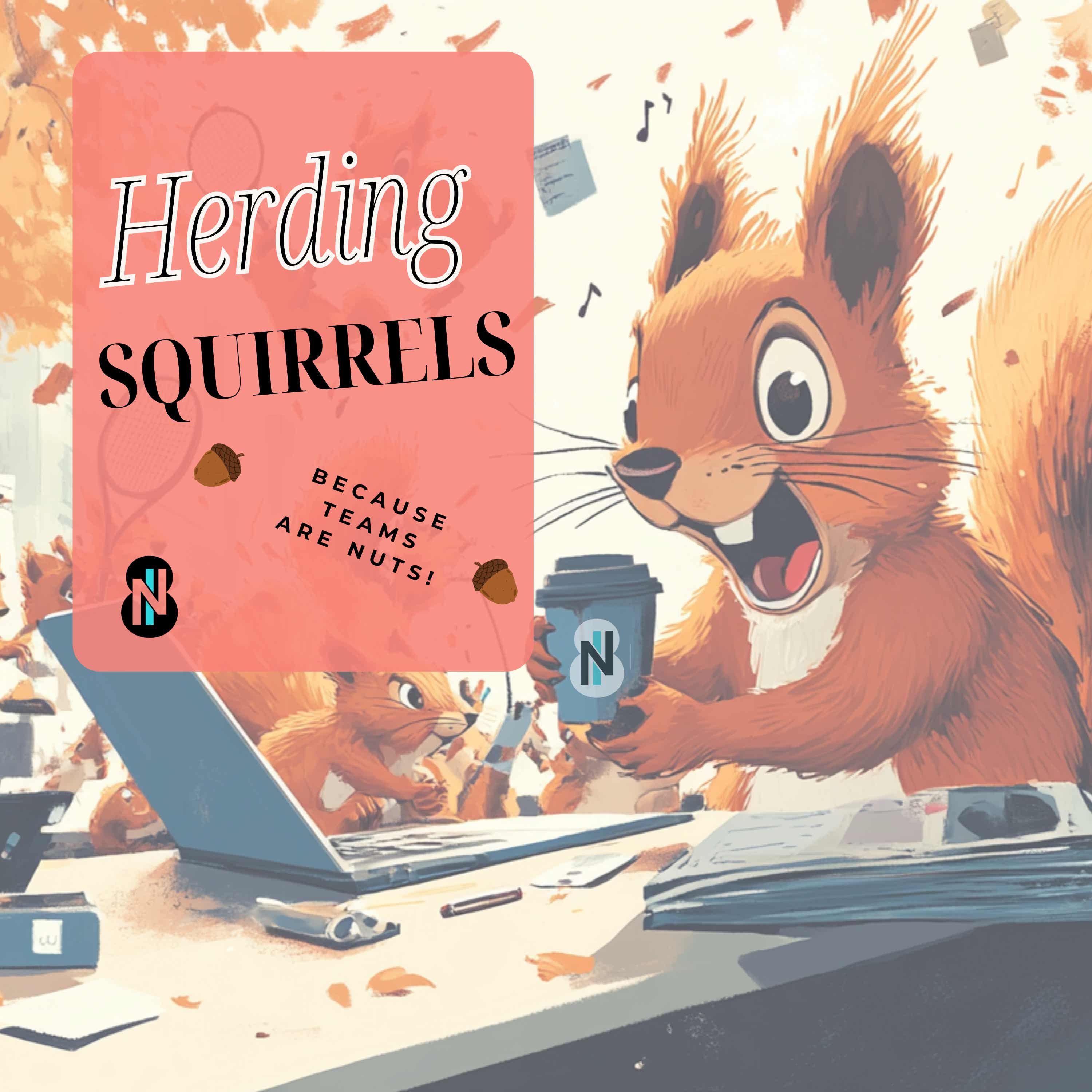Herding Squirrels

Herding Squirrels
Podcast Description
Ever tried to get a group of squirrels to move in the same direction?
Welcome to modern teamwork!
Herding Squirrels is a podcast that explores the chaotic, wonderful, and sometimes maddening world of teams in our hyperconnected age. From Slack notifications pinging like acorns falling from a tree to the constant scatter of competing priorities, we dive into what makes teams tick. herdingsquirrels.substack.com
Podcast Insights
Content Themes
The podcast focuses on themes such as team dynamics, effective leadership, and the challenges of remote work. Episodes explore specific topics like communication breakdowns, personal vs. team perspectives in leadership, and innovative approaches to building cohesive teams, featuring real-life examples and insightful discussions.

Ever tried to get a group of squirrels to move in the same direction?
Welcome to modern teamwork!
Herding Squirrels is a podcast that explores the chaotic, wonderful, and sometimes maddening world of teams in our hyperconnected age. From Slack notifications pinging like acorns falling from a tree to the constant scatter of competing priorities, we dive into what makes teams tick.
Episode Overview
What does it take to scale a fintech product from startup to flagship while keeping your team aligned and engaged? Gowri Sivaraman has spent 25+ years answering that question across multimillion-dollar products at companies like Intuit. In this episode, she shares the hard-won wisdom behind building teams that hold each other accountable and have fun doing it—revealing why the best teams never lose sight of their shared vision, how to remove emotion from cross-functional accountability, and what a failed basketball attempt taught her about leadership vulnerability.
About Gowri
Gowri Sivaraman] is a visionary technology leader with over 25 years of experience shaping multi-million-dollar products across the globe. She’s built and scaled digital consumer, small business, and fintech solutions that millions rely on every day — from AI-driven platforms to the devices we use in our pockets. Known for blending big-picture vision with hands-on execution, Gowri has a track record of turning ideas into innovations that not only engage users but also fuel significant business growth.
Timestamps
[00:00] Introduction and welcome[00:40] Build #1: Who Gowri is outside of work—gardening, automation, and building things that grow[02:10] Build #2: Best team experience—QuickBooks Capital’s journey from COVID startup to flagship product[04:45] Keeping your eye on metrics and KPIs as you scale[05:03] Build #3: Nightmare team scenario—when everyone runs in different directions without a shared vision[06:52] Build #4: Leading through uncertainty—adaptability, role modeling, and painting vision for the team[09:39] Staying on top of market changes: TLDR AI, conferences, and dedicating 10% of time to industry learning[12:41] Global Engineering Days at Intuit—a full week for experimentation[13:07] Building cross-functional accountability without being abrasive—using data to separate person from problem[16:09] Building fun and camaraderie: Top Gun, Top Golf, and the power of team activities[17:36] The basketball moment—how showing vulnerability inspired a team member[19:05] Build #5: Leadership advice—stay true to your north star and build a community you can lean on[20:49] Gowri’s reflection on building with LEGO bricks
Notable Moments
“The constant is change.” Gowri’s framework for leading through uncertainty starts with accepting that flux is the norm—and then equipping yourself and your team with the right tools and learning mindset to adapt.
Separate the person from the problem. When holding cross-functional teams accountable, Gowri emphasizes using data and facts rather than finger-pointing. Lay out the evidence of what happened, and the actual person becomes secondary to solving the problem.
Vulnerability builds trust. Gowri shared a story about playing basketball at a team event despite having no skills—and kept trying anyway. A team member later told her how inspiring it was to see a leader be okay with failing publicly. Sometimes the low-stakes moments create the biggest lessons.
“Never take your eye out of sight.” Her best team build featured an eyeball at the top—a reminder that as teams and technology grow, you must maintain clear focus on what matters: customer outcomes and system stability.
Where to Find Gowri
LinkedIn:Gowri Sivaraman
This is a public episode. If you would like to discuss this with other subscribers or get access to bonus episodes, visit herdingsquirrels.substack.com

Disclaimer
This podcast’s information is provided for general reference and was obtained from publicly accessible sources. The Podcast Collaborative neither produces nor verifies the content, accuracy, or suitability of this podcast. Views and opinions belong solely to the podcast creators and guests.
For a complete disclaimer, please see our Full Disclaimer on the archive page. The Podcast Collaborative bears no responsibility for the podcast’s themes, language, or overall content. Listener discretion is advised. Read our Terms of Use and Privacy Policy for more details.